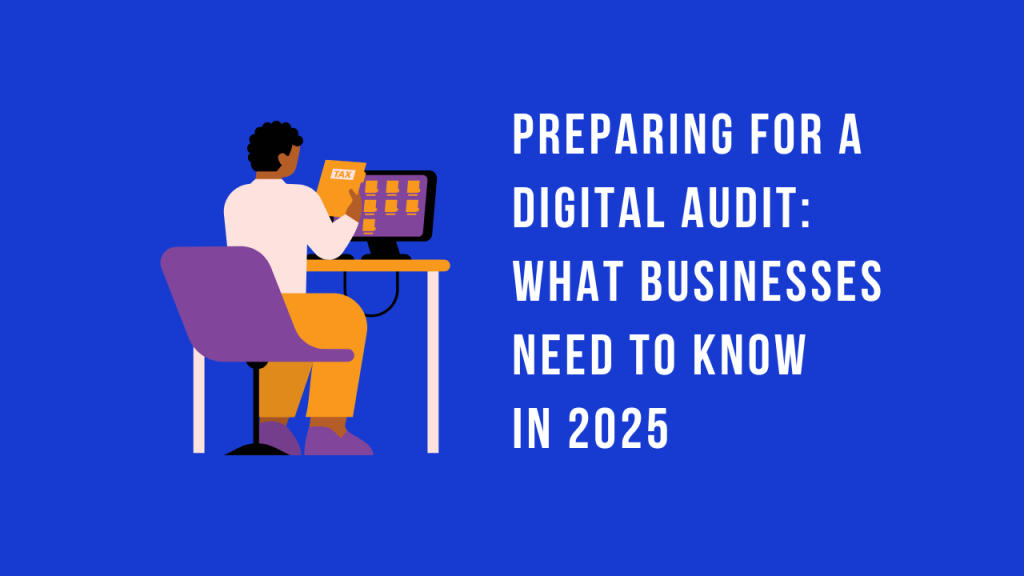Preparing for a Digital Audit
In today’s rapidly evolving digital landscape, traditional audit practices are no longer sufficient to meet the demands of modern businesses. By 2025, digital audits will become the norm, driven by advancements in technology, changing regulatory requirements, and the growing need for transparency and efficiency. This shift towards digital auditing offers both challenges and opportunities for businesses. Understanding what a digital audit entails and how to prepare for it is crucial to ensuring compliance and optimizing business processes.

What Is a Digital Audit?
A digital audit is a comprehensive assessment of a company’s financial records, internal controls, and compliance processes using digital tools and technologies. Unlike traditional audits, which rely heavily on manual data collection and analysis, digital audits leverage advanced software, data analytics, and artificial intelligence (AI) to streamline the auditing process. This allows auditors to analyze vast amounts of data quickly and accurately, providing deeper insights into a company’s financial health and operational efficiency.
Key Trends Shaping Digital Audits in 2025
- AI and Machine Learning: Artificial Intelligence (AI) and Machine Learning (ML) will play a pivotal role in digital audits by automating routine tasks such as data entry, reconciliation, and anomaly detection. These technologies will enhance the accuracy of audits, reduce human errors, and enable auditors to focus on more strategic aspects of the audit.
- Blockchain Technology: Blockchain offers a secure and immutable ledger for recording transactions, making it an invaluable tool for digital audits. By providing a transparent and tamper-proof record of transactions, blockchain can significantly reduce the risk of fraud and improve the reliability of financial data.
- Data Analytics: Advanced data analytics tools will enable auditors to analyze large datasets and identify patterns, trends, and anomalies that may indicate potential risks or areas for improvement. This will enhance the audit process by providing real-time insights and facilitating more informed decision-making.
- Cloud Computing: Cloud-based audit platforms will become more prevalent, allowing for secure, real-time access to financial data and audit processes. Cloud computing will enable auditors and businesses to collaborate more efficiently, streamline document sharing, and ensure data security.
- Regulatory Compliance: As regulatory bodies continue to adopt digital technologies, businesses must ensure compliance with new digital auditing standards and reporting requirements. Staying up-to-date with regulatory changes will be critical to passing digital audits successfully.
How to Prepare for a Digital Audit
- Digitize Financial Records: One of the first steps in preparing for a digital audit is to digitize all financial records, including invoices, receipts, bank statements, and payroll records. Using accounting software can help streamline this process, making it easier to organize and access financial data. Ensure that all records are up-to-date and accurately reflect the company’s financial activities.
- Implement Robust Internal Controls: Strong internal controls are essential for preventing fraud and ensuring the accuracy of financial data. Businesses should review their internal control systems and implement digital solutions that enhance these controls, such as automated reconciliation processes, access controls, and real-time monitoring of transactions.
- Leverage Technology: Invest in advanced audit and accounting software that integrates AI, data analytics, and blockchain technology. These tools can automate routine tasks, enhance data accuracy, and provide auditors with deeper insights into the company’s financial health. Additionally, ensure that your financial team is trained in using these technologies effectively.
- Ensure Data Security: Data security is a critical component of digital audits. Businesses must implement strong cybersecurity measures to protect sensitive financial information from breaches and unauthorized access. This includes using encryption, secure access controls, and regular security audits to identify and address vulnerabilities.
- Stay Informed on Regulatory Changes: Regulatory requirements for digital audits are continually evolving. Businesses must stay informed about changes in auditing standards and reporting requirements to ensure compliance. This may involve consulting with audit professionals or participating in industry forums to stay abreast of the latest developments.
- Conduct Pre-Audit Assessments: Before the official audit, conduct an internal pre-audit assessment to identify potential areas of concern. This will help you address any issues proactively and ensure that your financial records and processes are in order. Consider working with an external auditor to conduct a mock audit to test your readiness for a digital audit.
Benefits of Digital Audits
- Increased Efficiency: Digital audits streamline the auditing process by automating data collection and analysis, reducing the time and effort required to complete an audit. This allows auditors to focus on more complex and strategic aspects of the audit, improving the overall quality of the audit process.
- Enhanced Accuracy: By leveraging advanced technologies such as AI and data analytics, digital audits minimize human errors and enhance the accuracy of financial assessments. This provides businesses with more reliable and precise audit results.
- Improved Transparency: Digital audits provide a transparent and comprehensive view of a company’s financial health and internal controls. This transparency helps build trust with stakeholders, investors, and regulatory bodies, demonstrating a commitment to good governance and compliance.
- Real-Time Insights: Digital audits enable real-time analysis of financial data, allowing businesses to identify and address issues promptly. This real-time visibility into financial performance can lead to more informed decision-making and improved financial management.
Challenges to Consider
While digital audits offer numerous benefits, they also present certain challenges. Implementing digital audit technologies requires an initial investment and a commitment to ongoing training for financial teams. Additionally, businesses must navigate the complexities of data security and regulatory compliance in the digital landscape. By planning and investing in the right tools and strategies, businesses can overcome these challenges and fully harness the advantages of digital audits.
Conclusion
Digital audits are becoming the new standard in business compliance and financial management. With technology evolving and regulatory expectations increasing, businesses need to stay ahead by understanding and implementing best practices for digital audits. This means integrating advanced digital tools, maintaining secure and accurate financial records, and ensuring data privacy.
Finout is here to support you in this transition. With our expertise in financial compliance and digital solutions, we can help your business become audit-ready and maintain a high level of transparency. Let Finout guide you through the complexities of digital audits, ensuring your business is prepared for the future.

